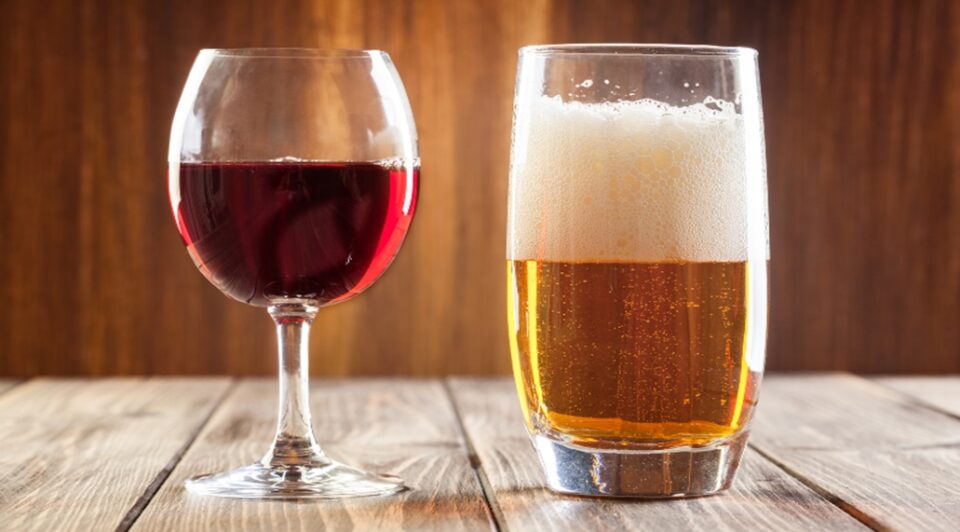Wine tasting and beer sampling are two very commonly enjoyed experiences in the world today. These activities invite participants to taste the complications of flavours and fragrances in their respective drinks. However, despite focusing on enjoying a beverage, they offer very different experiences. Let’s talk about the main differences between wine tasting and beer sampling from the environments in which they take place through the intricacies of the beverages.
The Art of Wine Tasting
Wine tasting is said to be one of the most elite and rich experiences, created to depict the wine’s subtle flavours and aromas. A participant in wine tasting uses all of his senses while observing every aspect of the wine. After inspecting the colour and clarity of the wine, the aromas are inhaled, and finally, with a wee sip, the taste and finish are assessed.
At the same time, the atmosphere in which wine tasting takes place plays no less significant role. In a vineyard or wine restaurant, everything is distinguished by the elegance of style and refinement of sophistication- everything is an expression of history and wine industry tradition. In a wine restaurant, the entertainment process is completed with the appropriate wine lists carefully compiled and trained sommeliers leading guests through the tasting process. The environment creates a level of awareness for the participants about the craftsmanship that goes into each bottle, elevating the taste to a discovery of the winemaker’s artistry.
The other crucial aspect of wine tasting is its pairing attribute. Many wine restaurants have their offerings ready and prepared to complement specific dishes, making flavours that food and wines produce rich. The wine pairing with food makes it unique as a gourmet activity where much attention is given to how various flavours go into juxtaposition.
The Appeal of Beer Tasting
Where wine tasting is more formal and traditional, beer tasting provides a much more relaxed, casual approach. Beer tasting tends to occur within pubs, breweries, or festivals featuring beer; the event may take on a more lively, less formal atmosphere than would be common in wine-tasting events. This relaxed environment allows for much more exploration since one can test so many styles of beer-from pale ales to stouts-as can without all the fanfare associated with wine tasting.
Whereas with wine, with the pretentious refinement tradition, only recently, in the era of rising craft brews, it rediscovered itself, a sample of beer allows discovering a variety of craft beers, differing in ingredients, taste, and brewing technique. Brewers experiment with many hops, malts, and yeast to produce different tastes adapted to different preferences. This would make the beer sampling much more diverse regarding flavour profiles than wine tasting, giving tasting participants a chance to taste new and exciting brews.
Another aspect of beer sampling events exploits the opportunity to promote sociability and social bonding. Drinking remains an occasion where people get together to share their views and preferences. If this happens in a casual pub or at a busy beer festival, the social character of beer sampling characterises the experience and differentiates it from the solitary nature of wine tasting.
Comparing the Flavours
Probably the biggest difference in comparison between wine tasting and beer sampling is the flavour profiles of the beverage. Wine flavours are often subtle with nuances of complex balance; a good wine shows layers of fruit through earthy notes that can linger and even last after the finish. Promotion of wine is then on the vintage, region, grape or all three that describe its specific profile.
Meanwhile, the flavours of beers can range from light and crisp to rich and bold. Since the quantity of ingredients differentiates for brewing, say, types of hops and malts, the beer can differ significantly more from the bitter notes of an IPA to the roasted taste of a porter. This will be a strong contrast as provided in beer sampling within one event, as participants will have room to make further space for more of them on their palates.
Role of Tradition and Culture
Wine tasting and beer sampling have an element of tradition but the cultural implication is different. Wine always symbolises luxury and class. This cultural setting thus shapes the perceptions and pitches of wine. Wine promotion campaigns will often be portrayed as exclusive, classy, and elegant to reinforce ties that the beverage has with elegant tastes and experiences.
Conversely, beer is perceived as a popular drink, consumed daily and associated with celebrations and parties. The message of beer ads is the easy accessibility of it to everybody. Hence, beer is a drink for any occasion. Connotations of elitism or class are attributed to wine, but beer boasts an edge of democracy-beer is inviting the crowd to explore its flavours.
While wine tasting and beer sampling are decidedly different activities, they are also distinct choices for different audiences or occasions. For instance, wine tasting represents a far more traditional, formal experience that centres on the sensory discovery of various flavours. Beer sampling, however, may provide the same diverse and innovative brews yet is entirely more informal and social.
Will it be a wine restaurant or a beer festival? It all depends on the type of atmosphere and experience you want to have. Both wine tasting and beer sampling allow you to discover new flavours, thus expanding the palate as long as it is fun and engaging.
Want to take your wine tasting to a whole new level? Connect with us at Wine Connection for the carefully crafted odyssey of fine wines and pairing. See what we have in store for you and let’s lead you through the art of wine tasting!

